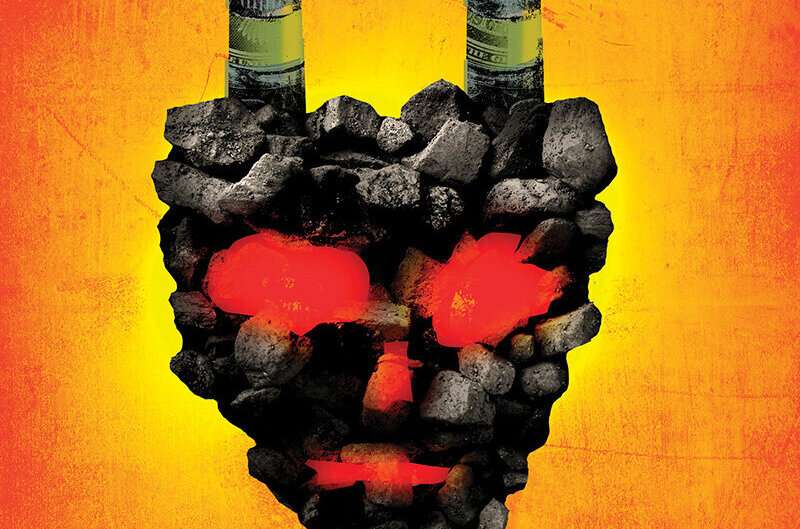Beyond addressing climate change, USC alumnus John Whysner says reducing air pollution would have immediate health benefits. Credit: Richard Borge/The iSpot
We're surrounded by manmade chemicals, from bits of dust in the air we breathe to the fabrics we wear. Not all are dangerous, though. Toxicologists like John Whysner, Ph.D. have the difficult task of determining which ones might be. The author of The Alchemy of Disease: How Chemicals and Toxins Cause Cancer and Other Illnesses got his start in toxicology studying the venom of poisonous snails at USC, home of a leading center for developing anti-venom in the 1950s. The Keck School of Medicine of USC graduate talks with writer Sarah Nightingale about the science behind harmful chemicals and fossil fuels' effects on human health.
As consumers, we often hear that certain chemicals are toxic or cause cancer. How do toxicologists determine if that's true?
This is a complicated process that involves studying people who have been exposed to a certain chemical, as well as animal studies and other laboratory tests. There may be a simple relationship, such as chemical X causes disease Y, or it may be more complex. A chemical can cause several types of toxic effects depending on the dose and the extent and circumstances of the exposure.
A lot of our knowledge comes from studying people who have been exposed to high levels of harmful chemicals through their work. For example, we know from occupational health studies that asbestos exposure causes a type of cancer called mesothelioma and that vinyl chloride, used to manufacture PVC plastics, causes liver cancer.
Even more of what we know comes from animal studies that test vast numbers of chemicals used as pharmaceuticals or food additives and in household products. Unfortunately, animal models are not necessarily good predictors of chemical-induced diseases in humans, especially when it comes to cancer and other complex, genetically driven diseases. What happens is that some chemicals are mislabeled as toxic to humans when they aren't, and more worryingly, we are missing some that are. The lack of good toxicity models is the biggest problem facing the field.
The good news is that toxicologists have made great discoveries concerning the health effects of chemicals we encounter in our daily lives, and the application of this knowledge for public health benefits has been successful in many areas.
About 7 million people die prematurely each year from polluted air. Why is that still happening?
When it comes to the effects of air pollution, the application of our knowledge has been inadequate. The production and use of fossil fuels, for example, still exposes workers to disease-causing agents and still results in air pollution that leads to cancer, stroke, heart and lung disease. In this case, the problem is a lack of political motivation to control exposure to these chemicals rather than a lack of knowledge.
Have the health risks of fossil fuels been overshadowed by the conversation on climate change?
Yes. The health problems associated with burning fossil fuels, which are immediate and happen on a personal level, share a common cause with global climate change. As a toxicologist, I think we should place the emphasis for cleaning up our air on the immediate health benefits. That would also solve the global warming problem.
What is your connection to USC?
When I was a senior at L.A. High School, my physics teacher encouraged me to apply for a National Science Foundation internship. Through that program, I spent a summer doing research with Dr. Paul Saunders, an associate dean in USC's medical school. After I graduated high school, I attended Johns Hopkins University in Maryland, but each summer I returned to L.A. and worked in Dr. Saunders' lab doing research on a venomous sea creature called the cone snail.
Dr. Saunders was a mentor to me, and he encouraged me to apply for medical school at USC. I applied for the MD/Ph.D. program, where I completed graduate research in biochemistry in Professor Boyd Harding's lab and received incredible experience at L.A. County+USC Medical Center. My USC education paved the way for a residency at Jacobi Hospital in the Bronx, my career as a toxicologist and a professorship at Columbia University.
Who should read your new book?
"The Alchemy of Disease" was published in June 2020 by Columbia University Press. It summarizes what we know about disease-causing substances and how those discoveries were made from a historical perspective. It's not a textbook. Rather, it's a trade science book that's aimed at other scientists as well as anyone with an interest in how exposure to chemicals affects our health. I dedicated the book to my USC mentor, Dr. Paul Saunders.
More information: How Chemicals and Toxins Cause Cancer and Other Illnesses. cup.columbia.edu/book/the-alch … isease/9780231191661
Provided by University of Southern California
























